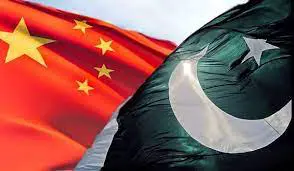Editor's Note:
The writer, Mr. I. Hussain Janjua is a senior media professional and analyst having experience of research & broadcast journalism in different organisations. He is a non-resident fellow of Chengdu Institute of World Affairs (CIWA). (Email: [email protected]; twitter: @ihussainjanjua)
Pakistan and China have enjoyed close and friendly relations since the establishment of diplomatic relations in 1951, and over the years, the relationship has blossomed into an "All-Weather Strategic Cooperative Partnership", with the CPEC at its core. Pakistan considers China as one of its closest friend and partner and China considers Pakistan as its "Iron Brother".
In fact, it is friendship that is based on sound geostrategic and realist calculations while four issues terrorism, security of Chinese personnel engaged in different projects in Pakistan, people to people contact and India have been extremely important in shaping up the changing outlook of Pakistan-China relations.
Historically, four major events; the boundary agreement in March 1963, support in 1965 war, the Kissinger secret visit to China arranged by Pakistan and the rare veto option adapted by China in United Nations Security Council smoothened this relationship towards increased cooperation.
However, the inimical forces have always been conspiring to damage this relationship and bullying Pakistan to downgrade the same as clearly expressed by Prime Minister Imran Khan in his this week interview with English-language state-broadcaster China Global Television Network (CGTN).
Pakistan was under "pressure" from the US and other Western powers over his country's all-weather ties with China, the Pakistani Prime Minister said in implied words but vowed to never buckle under pressure.
Pakistan and China enjoy a "very special relationship" spanning over 70 years and nothing could change these time-tested ties, Khan said in the interview.
In fact, these relations have continued to gain strength despite changing international stage from global war on terror to other major events. The bond of friendship can be traced back to centuries-old trade relations, when Chinese traders used to travel through Pakistan on their business trips to the Middle-East, Europe, and the rest of the world through ancient Silk Route.
Being a highly strategic country, China has a pivotal role in the region; the enhanced cooperation in defense production is remarkable in the changing regional dynamics --- focus being to secure the region and access to the markets of Middle East particularly in the field of energy. Their joint ventures besides peaceful use of nuclear technology and science and technology and joint production have led to manufacture the MBT 2000 Al-Khalid Tank and JF-17 Thunder which besides strategic significance is a unique example of Sino-Pak deep-rooted friendship.
Prime Minister Imran Khan while talking about the evolving regional rivalry between the US and China, Khan said that "Pakistan thinks it is very unfair for the US or other powers - western power" to pressurize "countries like us to take sides" in a conflict with China.
"Why should we take sides? We should have good relations with everyone. It is not going to happen if pressure is put on Pakistan to change its relationship or downgrade its relationship with China, it wouldn't happen," Khan said.
Emphasizing the deep relationship with China, Khan said that Pakistan would never bend under any kind of pressure. "Whatever will happen, our relationship between the two countries - no matter what pressure is put on us - is not going to change," he said.
He said that there was a "strange, great rivalry" taking place in the region which was an open secret. "You see the United States being wary of China. The way United States and China are looking at each other creates problems because what the United States is doing is it has formed this regional alliance called the Quad, which is US, India and a couple of other countries," Khan said.
The Quad or Quadrilateral alliance consisting of the US, India, Japan and Australia has been formed to counter growing Chinese influence in the Indo-Pacific.
Khan said that China and Pakistan enjoyed strong political ties but the relationship was not only limited to official relations but it was also "people to people relationship" which would be further deepened.
He said trade was important to increase ties in future and termed the $60 billion China-Pakistan Economic Corridor (CPEC) as the "biggest thing happening in Pakistan". It connects Gwadar Port in Pakistan's Balochistan with China's Xinjiang province, is the flagship project of China's ambitious multi-billion-dollar Belt and Road Initiative (BRI).
Khan while highlighting the 70 years of diplomatic ties, Khan said China always stood with Pakistan, which "always had a very special relationship with China".
He said that China "always stood with us" whenever Pakistan was in trouble politically or internationally or in a conflict with its neighbor.
"In good times, everyone stands with you but in your difficult, tough times, bad times, you remember those people who stood by you. That's why you will find that in Pakistan, people always have a special fondness for people in China," he said. A friend in need is a friend indeed, what he meant.
The Sino-Pak relationship is bound to attain new heights as the leadership of both the countries is committed to taking this relationship forward. President Xi Jinping’s attribution of the friendship between China and Pakistan as "unbreakable and rock-solid" despite changes in the international and regional situation is more than significant while one cannot forget to recall the famous statement of Chinese Premier Li Keqiang “If you love China, Love Pakistan too.” These statements are not only the building blocks but the proven realities of the glories of time between the two countries.
Moreover, President Xi Jinping forthcoming visit that was scheduled is likely to cement this relationship to new heights and do away with misconceptions, if any, in the greater regional context.
(ASIA PACIFIC DAILY)
 简体中文
简体中文

